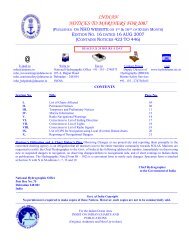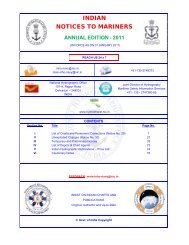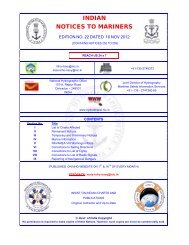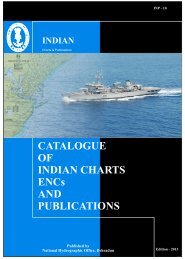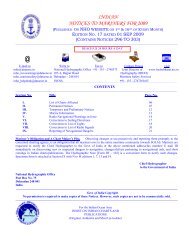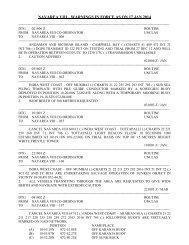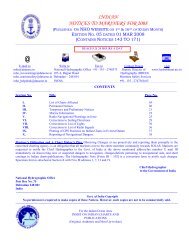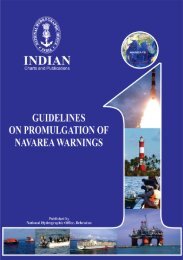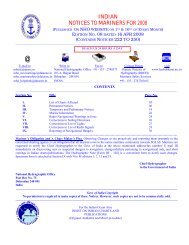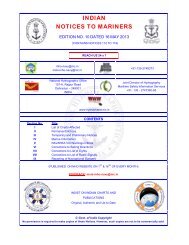INDIAN NOTICES TO MARINERS - National Hydrographic Office
INDIAN NOTICES TO MARINERS - National Hydrographic Office
INDIAN NOTICES TO MARINERS - National Hydrographic Office
Create successful ePaper yourself
Turn your PDF publications into a flip-book with our unique Google optimized e-Paper software.
4. 1<br />
SECTION – IV<br />
MARINE INFORMATION<br />
1. NAVTEX TRANSMISSION<br />
MSI Promulgation by NAVTEX Stations at Mumbai and Chennai are temporarily out of operation.<br />
(Source – DG Shipping)<br />
2. MISIDENTIFYING FISHING BOATS AS PIRATE SKIFFS<br />
All merchant vessels entering Indian EEZ are advised that dense fishing activity may be encountered off<br />
West Coast of India. Fishing is generally carried out by mechanized boats and single hull boats with outboard motors<br />
carrying 4-5 crew using long lines upto 50 NM from coast. The vessels traversing the nets are likely to be approached<br />
by fishing boats for safeguarding nets and lines and should not be mistaken as skiffs and PAG’s. Masters of vessels to<br />
report any suspicious activity of fishing vessels immediately to MRCC (Mumbai) on telephone +91 -22-24388065,<br />
24316558, Email: - indsar@vsnl.net, or icgmrcc_mumbai@mtnl.net . Any suspicious activity of skiffs / boats to be<br />
photographed if possible. Merchant vessels with armed guards on board are to report presence of guards to Indian<br />
Navy/Coast Guard while transiting Indian EEZ.<br />
(Source - NAVAREA VIII Warning 100/12)<br />
3. DISPLAY ANOMALIES IN ECDIS<br />
(a) Mariners are advised that the International <strong>Hydrographic</strong> Organization (IHO) check data set shows that some<br />
ECDIS systems fail to display some significant underwater features in the standard display mode. The use of this<br />
check data set, issued through ENC service providers and available from the IHO website www.iho.int, to check the<br />
operation of ECDIS is strongly recommended. JRC has confirmed that certain versions of JRC ECDIS fail to display<br />
some types of wreck and obstructions, including stranded wrecks, in any display mode.<br />
Where JRC ECDIS is in use, paper charts should be the primary means of navigation until the ECDIS has<br />
been proved to operate correctly. See www.jrc.co.jp/eng/product/marine/whatsnew/20120313/index.html for further<br />
information.<br />
(b) Some Electronic Chart Display and Information Systems (ECDIS) may exhibit operating anomalies . The<br />
International Maritime Organization’s (IMO) circular SN.1/CIRC.312 pages /imodocs.aspx (registration required)<br />
lists identified anomalies, There characteristics and remedial advice. Mariners are reminded that they should access<br />
the International <strong>Hydrographic</strong> Organization (IHO) data presentation and performance check (DPPC) dataset (news<br />
links of http.//www.iho.int/srv1) and ensure that all installed ECDIS units are checked.<br />
(Source - NAVAREA VIII Warning 141/12 & 529/12)<br />
3. SAFETY FAIRWAYS, RECOMMENDED ROUTES, TRAFFIC SEPARATION<br />
SCHEME<br />
The Director General Shipping has established Safety fairways, recommended routes and traffic separation scheme<br />
(TSS) in restricted Indian waters including the offshore development area to enhance safety of navigation. The details<br />
of coordinates for the above have been published in the fortnightly Indian Notices to Mariners Edition No 14 of 2008<br />
(16 th July 2008).<br />
(a) Safety Fairways: An area within which permits are not granted for the erection of oil or gas related<br />
structures. The use of a safety fairway is not usually mandatory, but is recommended. Safety fairways have<br />
been promulgated in and round offshore development area in Arabian Sea up to the Exclusive Economic



